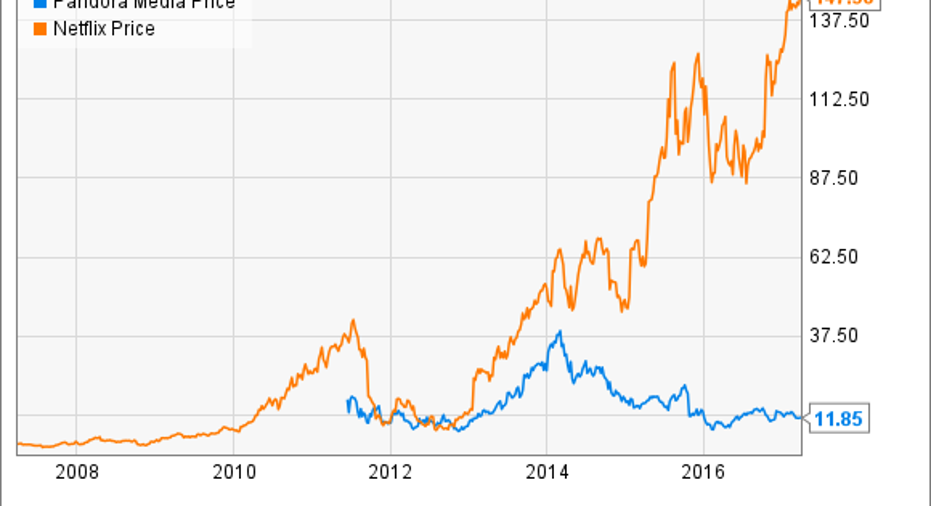Why Pandora Could Stand to Be More Like Netflix

Pandora(NYSE: P) recently introduced its new Pandora Premium on-demand music service. Available for $9.99 per month, subscribers can now listen to songs of their choice versus the previous model of listening to playlists based on genres, artists, etc.
Another streaming service, Netflix(NASDAQ: NFLX), has a similar business model for video content. Its primary subscription is also $9.99 per month. If you had invested $1,000 in Netflix when it went public in 2002, you would have over $135,000 today.
Pandora, on the other hand, has seen its stock price decline 27% since debuting at $16 per share in 2011.Now that it is no longer relying solely on an ad-supported business model and is offering paid subscriptions, can Pandora deliver Netflix-like returns to its shareholders?
A friend in disruption
Both companies have benefited from the disruptive nature of the internet. One focused on video and built a brand and business that has captured the interest of investors worldwide. The other, at the forefront of music streaming, has been a stock laggard for years. Looking under the hood of each business reveals several similarities and a few key differences.
Data by YCharts.
Netflix -- the leader
Netflix has almost 100 million worldwide subscribers, and with the notable exception of China, is the dominant player in the streaming video subscription space.
One of the cornerstones of its success was the development of an algorithm to help viewers find new content to explore. Looking at past viewing habits and program ratings allowed the service to personalize each user's home screen to serve up the choices most likely to capture a viewer's attention.
Image source: Netflix.
Another aspect of the service that has helped to set it apart from competition is exclusive content.As Netflix evolved, management made a key decision in 2011 to provide exclusive shows that could not be watched anywhere else. By locking down exclusive streaming rights to shows like House of Cards, the company began to build a franchise of unique viewing experiences that an audience could only see by subscribing to Netflix.
On the cost side, Netflix pays for its content on a fixed-fee basis. Regardless of the number of subscribers, once a contract is negotiated, the fee is set. This is important, as it means that increasing numbers of subscribers results in additional revenue for Netflix that is not shared in some predetermined amount with content creators.
Pandora -- the laggard
Much like Netflix, the key to Pandora's initial success had been its role in helping users explore and discover music. The Music Genome Project attracted a lot of attention for characterizing each piece of music with 450 musical attributes. Listeners like or dislike songs with a simple thumbs up or thumbs down rating (something that Netflix will soon be adopting as well). These ratings, coupled with the song attributes, allow Pandora to make personalized recommendations.
Today, Pandora has 81 million listeners.Unfortunately, there is essentially nothing that you can hear on Pandora that you cannot hear somewhere else. Pandora's subscription service is only available in the United States, while the ad-supported product is also available in Australia and New Zealand.
So even though the company has a unique tool to explore new music, the lack of original content means it cannot so easily replicate the appeal that Netflix has generated. Throw in the fact that the company has no plans of going global anytime soon, and we begin to see the growth limitations that Pandora will have to overcome.
To top it all off, Pandora has a licensing agreement with record labels and music publishers that requires it to pay a fee every time a song is played -- the more listeners, the higher the cost of the content. The company estimates that for every $1.00 it collects from subscribers, $0.65 will go to the content creators. This puts a significant limit on Pandora's earnings, as new subscribers only contribute a small portion of their subscription fee to the company.
Pandora itself may be very successful in poaching subscribers from competing services based on its well-known recommendation engine. And subscriber growth may very well push the stock towards its previous highs. However, as long as the company is tied to the current system of music royalties -- a system that removes much of the benefits from scaling the business -- Pandora will fall short of the success Netflix has enjoyed.
10 stocks we like better than Pandora MediaWhen investing geniuses David and Tom Gardner have a stock tip, it can pay to listen. After all, the newsletter they have run for over a decade, Motley Fool Stock Advisor, has tripled the market.*
David and Tom just revealed what they believe are the 10 best stocks for investors to buy right now and Pandora Media wasn't one of them! That's right -- they think these 10 stocks are even better buys.
Click here to learn about these picks!
*Stock Advisor returns as of February 6, 2017
Frank DiPietro owns shares of Netflix and Pandora Media. The Motley Fool owns shares of and recommends Netflix and Pandora Media. The Motley Fool has a disclosure policy.



















